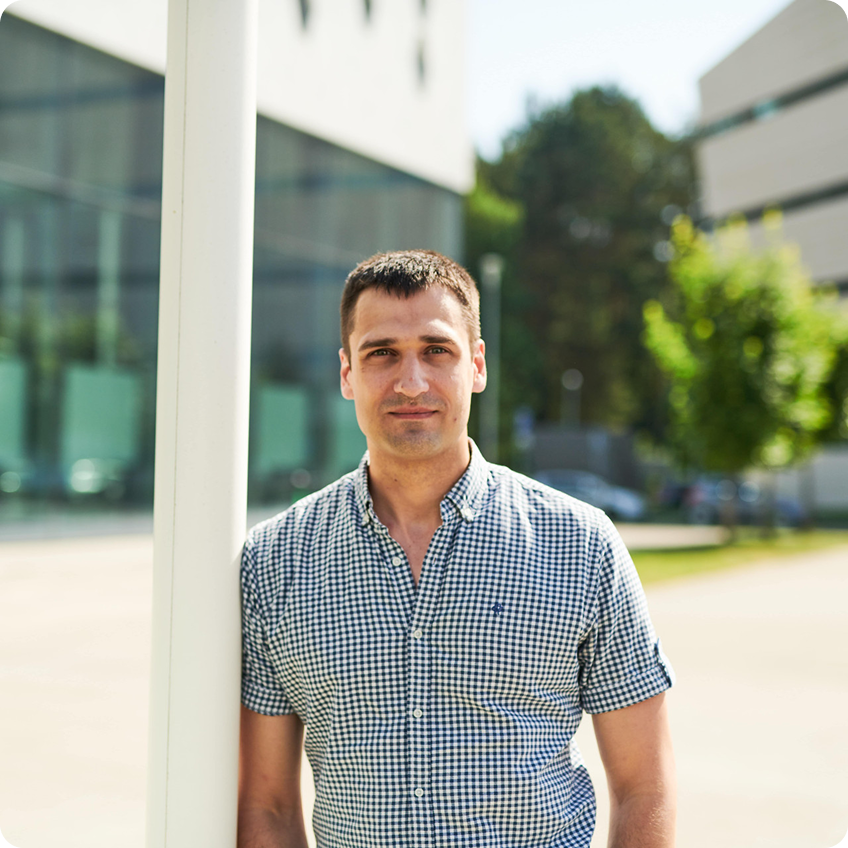Jonas Jurkevičius
When the kitchen’s on fire but everyone’s sipping coffee

A conversation with physicist and climate keynote speaker PhD Jonas Jurkevicius
A teenager opens the kitchen door expecting the scent of coffee — but instead, a wave of heat slams him. Open flames dance along the cabinets. The curtains are ablaze. In shock, he runs to the living room, where the rest of the family is already drinking coffee. “Fire!” he shouts.
“Relax, you’re clearly exaggerating,” mumbles the father, eyes still buried in his newspaper.
“It’s always hot in the kitchen,” nods his sister.
“Well, if he insists… maybe we should at least talk about it,” suggests the mother, glancing around.
Absurd? Yes. But it’s also a metaphor — and a painfully accurate one.
“This is the world we’re living in,” says physicist and PhD Jonas Jurkevičius. “Climate scientists are shouting about the escalating danger, and we’re politely flipping through reports, hosting conferences, signing protocols of intention — all while dragging our feet on real action.”
Jonas is one of the keynote speakers at @Shibui, delivering powerful climate talks to employees in companies that are beginning to take sustainability seriously.
Climate change will touch every one of us
By day, Jonas works at the Photonics and Nanotechnology Institute at Vilnius University, researching in the Semiconductor Optoelectronics roup. He also teaches physics students and gives public keynotes on climate change.
“This is the most important general knowledge topic of our time,” he says. “We must be informed. When COVID hit, we all learned overnight how to wear masks and wash our hands. Climate change is a bigger crisis — it affects the entire planet. And yet, what are we doing to stop it?”
If asked, many of us would list our efforts — separating waste, bringing reusable bags, choosing eco-products. But did you know you’d need to use that cotton tote bag 131 times before its environmental cost balances out?
Individual action helps — but not enough
The harsh truth? Even a person doing “nothing” — say, someone without a home — still indirectly generates massive emissions through the system that supports them. In reality:
- 76% of emissions come from energy production
- 85% of that energy is still fossil-fuel-based
- The top 20 fossil fuel companies account for nearly 30% of global emissions
- Only 1% of the world’s population creates more than half of all aviation emissions
So why don’t we act faster?
“Because we don’t grasp the scale of the threat,” Jonas says. “We hear, ‘temperatures will rise by a couple degrees.’ And in Lithuania? People joke — maybe we’ll finally get to take off our jumpers at the beach.”
But it’s not about warmth or comfort.
“That two- or three-degree rise means a shift in the internal energy of the climate system. It would irreversibly change the planet. This is not about sweating more in summer. It’s an existential risk — to economies, to societies, to everything.”
From wine to war: how climate change hits home
Jonas tailors his keynotes to each audience — using examples that cut close.
Migrants crossing into Lithuania from Belarus stirred national fear. But what happens when drought creates famine across parts of Africa? Millions may migrate North in search of food.
Love French wine? Heatwaves accelerate grape ripening, degrading flavour. Yields have already dropped by a third due to temperature volatility.
These aren’t distant problems. They’re already arriving.
We’re not saving the Earth. We’re saving ourselves
One of the most stubborn myths, Jonas says, is the phrase: “Let’s save the Earth.”
“The planet doesn’t need us. It’s survived cataclysms far worse than us — hurricanes, floods, tsunamis. These aren’t threats to Earth. They’re threats to us.”
And we’re already late. If humanity vanished tomorrow, the climate system would still take a century or more to stabilise.
“We’re not returning to pre-industrial times,” Jonas explains. “We’re heading into a new state — and our job is to shape it into something survivable.”
It’s not just about personal change
A clever advertising campaign once urged us to fight climate change by starting with ourselves. That’s true — but not enough.
“We need systemic action. Not just personal virtue, but policy, regulation, pressure on our governments.”
Right now, Jonas says, “we’re in a speeding car heading for a concrete wall. Instead of braking, we close our eyes and press the accelerator harder.”
Can this still be changed?
“I’m an optimist,” Jonas says. “I believe it’s not too late — and that’s why I speak.”
